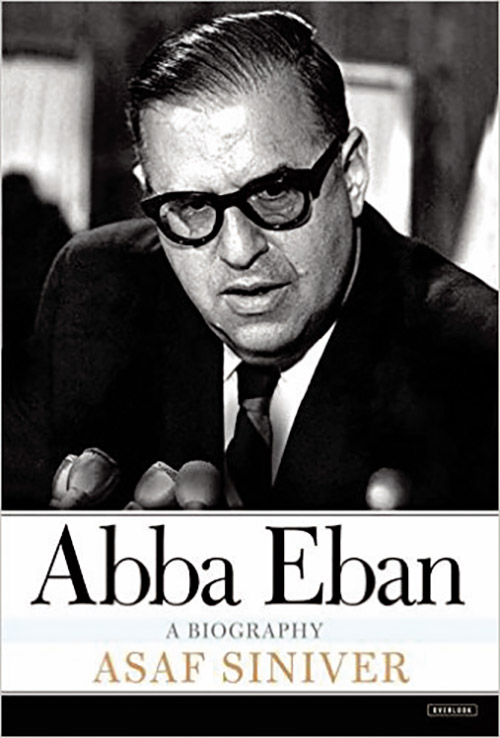
Reviewing: “Abba Eban: A Biography,” by Asaf Siniver (2015), Hardcover, 464 pages: Overlook Press. ISBN-10: 1468309331
Abba Eban’s life and the history of Israel in the 20th century were very much intertwined. From this book one can learn about all the important events in the history of Israel from the Balfour Declaration of 1917 through the Pollard affair of the 1980s.
Eban, who grew up in England as “Aubrey Eban,” is famous for being a gifted speaker and a tremendous intellectual. He had a Cambridge education and was fluent in 10 languages. He served in the British Army in Egypt and Palestine, and then ended up working for the Jewish Agency at the time of the creation of the Jewish State. He became Israel’s representative at the U.N. and its ambassador to the U.S. for 10 years. In 1959, he returned to Israel. In 1966, he was appointed foreign minister and served in this position until 1974. He remained in the Knesset until 1988.
From the book, one learns all about the negotiations of 1947-49, 1956, 1967 and 1973 and the key U.N. resolutions: 181, 242 and 338. One of the most important diplomatic missions ever undertaken for Israel was Eban’s trip to the U.S. at the end of May 1967 to meet President Johnson on the eve of the Six Day War. The noose was tightening against Israel by the Arab armies, and Eban had to confer with Johnson and gauge what would be the American response if Israel fired the first shot, as it ultimately had to, to survive. Eban gave one of his most brilliant speeches on June 7, 1967 to the U.N., justifying Israel’s self-defense in the 1967 war.
It is surprising to learn that Eban had a more limited role in the U.N. negotiations surrounding the 1973 war. Prime Minister Golda Meir was not a fan of his and purposely kept him out of the loop, even though he was the foreign minister. She preferred dealing with Israel’s ambassador to the U.S., Simcha Dinitz, and have him negotiate for Israel. To reduce Eban’s involvement at the U.N. in this time of crisis, she came up with the idea of calling Eban back to Israel “for consultations”!
My implication above that Eban had a role in the Balfour declaration was meant as humor. Eban was born in South Africa in 1915. His father became seriously ill and the family moved to London in search of better medical treatment when Eban was only a few months old. (Eban used to joke that he left South Africa as a baby because he “couldn’t stand Apartheid”!) After his father passed away in 1916, his mother found a job as a secretary and translator in the Zionist Organization office in London. On the late evening of Nov. 1, 1917, his mother received a phone call from Nahum Sokolow about “an important document” that needed to be translated into French and Russian. Eban had written in his autobiography that she had been occupied with his “querulous two-year-old screamings” and that she made the “characteristically Zionist decision: she simply left her infant son to fend for himself and went off into the November fog.” I was always wondering about her leaving the 2-year-old and his slightly older sister alone. Siniver clarifies that Eban was overdramatizing a bit, adding the detail that the three of them were living with the mother’s parents, so Aubrey and his sister were not actually left alone.
A main theme of the book is that, although Eban was tremendously respected by the Jews throughout the world and by foreign leaders, he did not achieve that kind of respect in Israel. One reason for this was that he spent his youth in England, and did not have the Eastern European or kibbutz background of the other Israeli political leaders. Another was that he served in the British military but never in the Israeli military. Also, he did not spend his time making friends and political connections in Israel the way other Israeli politicians did. Siniver refers to him as a “very foreign foreign minister.” Golda Meir, on once hearing that Eban was considering running for premiership, responded humorously: “In which country?”
The author also points out that Prime Minister Eshkol did not trust Eban’s judgment, which he thought was clouded by too much idealism and not enough pragmatism. Eshkol once remarked that “Eban never gives the right solution, only the right speech!”
In 2001, Eban finally achieved the recognition he deserved in Israel, being awarded the Israel Prize. But his wife had to accept the prize on his behalf. He was 86 at the time and could not attend due to his Parkinson’s disease. He also had developed aphasia, losing his ability to speak. At his funeral in 2002, Ehud Olmert commented: “Never in the history of Israeli politics has anyone been able to carry the country’s message to more people, in more languages, in more countries across the globe, than this gifted man.” Indeed, in 1983, he was inducted into the International Orators Hall of Fame, as one of the modern era’s “ten greatest orators in the English language,” joining the likes of Abraham Lincoln, William Jennings Bryan and Martin Luther King, Jr.
After he left the Knesset in 1988, he became a professor in the U.S. He published several classic books, and became a sought-after lecturer.
I also highly recommend Eban’s own biography, “Personal Witness.” It is wittier than Siniver’s book, but Siniver’s book is necessary to get the full picture behind all the events. I also learned to appreciate from Siniver’s book how hard the life of an Israeli diplomat is on the spouse and children, due to all the traveling and constant emergencies that arise.
I was always wondering about Eban’s use of the name “Abba.” Wikipedia has a statement that, around the time the state came into being, “he changed his name to the Hebrew word Abba…as he could foresee himself as the father of the nation of Israel.” This sounds pretty far-fetched! Rather, Siniver explains that after Israel’s independence, Ben Gurion ordered Israel’s officials to Hebraicize their names. One morning, unbeknownst to him, Aubrey Eban discovered that his name had been changed by the government to “Abba Even” (father, stone). But at the beginning of the book, Siniver had written that the newborn was named “Abba” after his mother’s favorite grandfather, Abba Tobias Sacks, but was also given the name ”Aubrey.” So although it is clear that he grew up only using the name “Aubrey,” it seems that he was given the name “Abba” initially in some manner.
After 1974, when Eban was no longer the foreign minister, he began to express his political views more freely, and he expressed views more dovish than many of his Labor party colleagues. A very interesting passage in the book is a report of the last interview Eban gave, two years before he passed away, where he expressed his major regrets. He regretted that he did not fight harder to become Prime Minister, and he regretted that he failed to convince the public and the politicians that further concessions to the Palestinians were necessary in order for Israel to achieve peace and prosperity.
One caveat regarding Siniver’s book is that the author is fairly left-wing. For example, he makes the bizarre statement that Israel “is a nation that continues to believe that diplomacy must be subordinate to militarism.” Nevertheless, the author’s political views do not interfere with the work.
An interesting sidelight is that while Eban was Israel’s representative in the U.S. for 10 years, he was not an Israeli citizen. He had never applied. He suddenly had to apply when he returned to Israel in 1959. But even then, he could not vote for himself. Under the law, one had to have been a citizen for one year prior to voting in an election!
One of Eban’s most famous witticisms is that “the Arabs never miss an opportunity to miss an opportunity” to make peace with Israel.
By Mitchell First
Mitchell First is an attorney and Jewish history scholar. He can be reached at [email protected].
For more articles by Mitchell First, and information on his books, please visit his website at rootsandrituals.org.













